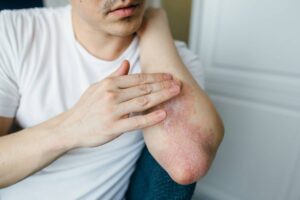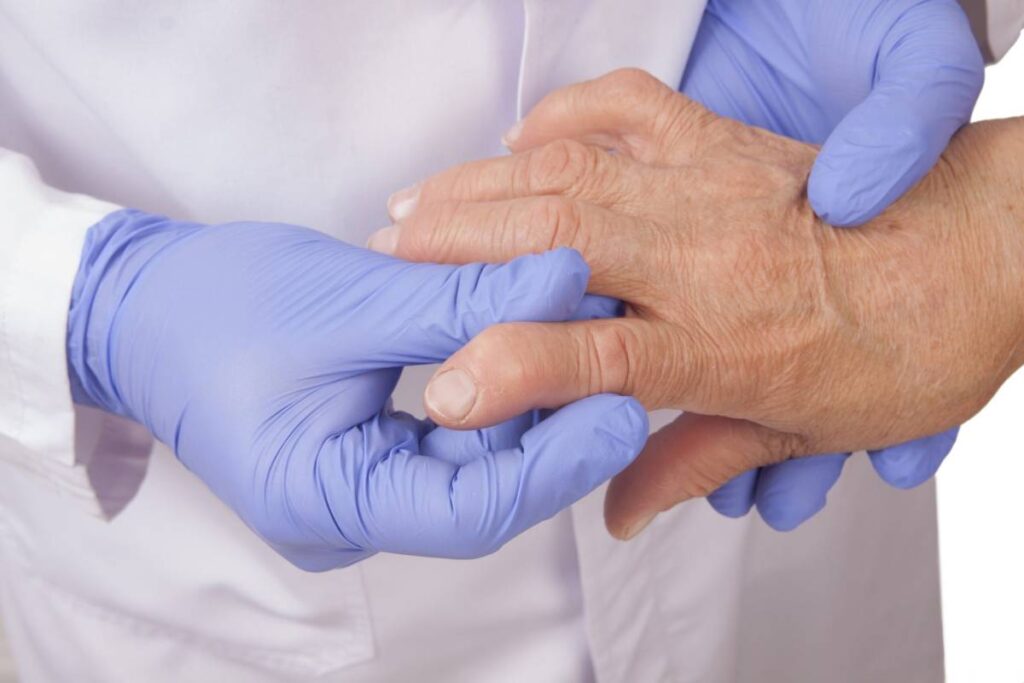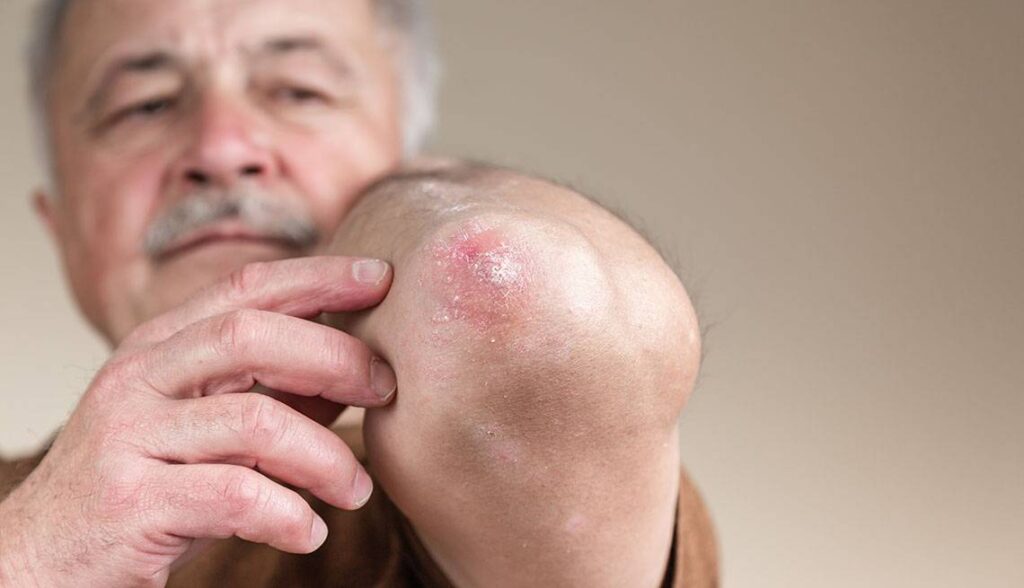If you have arthritis, you probably think mostly about joint pain and stiffness. But did you know arthritis can also affect your skin? Yes, many people with arthritis experience skin problems that can be uncomfortable and sometimes confusing.
Arthritis, especially types like rheumatoid arthritis and psoriatic arthritis, involves inflammation and immune system changes that don’t just stay in the joints—they can show up on your skin too.
In this blog, we’ll talk about the common skin issues linked to arthritis, the symptoms you should watch out for, and simple ways to protect and care for your skin. Keep reading to find out more.
Contents
Is There A Link Between Arthritis and Skin?
 Yes, there is a clear connection between arthritis and skin problems, especially in autoimmune types like rheumatoid arthritis and psoriatic arthritis. These forms of arthritis cause your immune system to attack your own body, leading to inflammation not just in the joints but also in the skin.
Yes, there is a clear connection between arthritis and skin problems, especially in autoimmune types like rheumatoid arthritis and psoriatic arthritis. These forms of arthritis cause your immune system to attack your own body, leading to inflammation not just in the joints but also in the skin.
This immune system activity can cause a variety of skin issues. The inflammation can affect the blood vessels, skin cells, and tissues, leading to noticeable changes on your skin’s surface.
So, if you have arthritis and notice any new or unusual skin symptoms, it might be related to the underlying disease process. Understanding this link helps you recognize when to seek treatment and how to better manage both your joints and your skin.
Common Skin Issues Caused by Arthritis
Arthritis can lead to several skin problems, especially in autoimmune forms like rheumatoid arthritis and psoriatic arthritis. Here are some common skin issues you might notice:
- Rashes: Red, itchy patches that can appear anywhere on the body, often linked to inflammation.
- Rheumatoid Nodules: Firm lumps under the skin, usually near pressure points like elbows or fingers, common in rheumatoid arthritis.
- Dry and Scaly Skin: Arthritis can cause your skin to become dry, flaky, or rough, making it more prone to irritation.
- Psoriasis Plaques: Thick, red, and silvery patches of skin, especially in psoriatic arthritis, which affects both skin and joints.
- Skin Discoloration: Areas of the skin may become lighter or darker due to inflammation or medication side effects.
- Ulcers and Sores: In severe cases, arthritis-related inflammation can lead to skin ulcers or slow-healing sores.
If you notice any of these symptoms, it’s important to talk to your doctor to get the right treatment and prevent complications.
Symptoms to Watch For on Your Skin
 If you have arthritis, keep an eye out for any changes or unusual symptoms on your skin. These could be signs that your arthritis is affecting your skin or that you might need medical attention. Watch for:
If you have arthritis, keep an eye out for any changes or unusual symptoms on your skin. These could be signs that your arthritis is affecting your skin or that you might need medical attention. Watch for:
- Red or inflamed patches that are itchy or painful
- Firm lumps or nodules under the skin near joints or pressure points
- Dry, flaky, or scaly skin that doesn’t improve with moisturizing
- Thick, silvery plaques, especially on the elbows, knees, or scalp
- Open sores or ulcers that heal slowly or keep coming back
- Changes in skin color, such as patches that become lighter or darker
- Unexplained rashes or bumps appearing suddenly
- Increased skin sensitivity or irritation
If you notice any of these symptoms, especially if they worsen or don’t go away, be sure to inform your doctor. Early treatment can help manage these skin issues and improve your comfort and quality of life.
How Arthritis Medications Can Affect the Skin
While arthritis medications are essential for controlling joint inflammation and pain, some of them can cause side effects that affect your skin. It’s important to be aware of these potential issues so you can manage them properly.
- Rashes and Allergic Reactions: Some medications, especially disease-modifying antirheumatic drugs (DMARDs) and biologics, may cause skin rashes or allergic reactions. These can range from mild redness to more severe irritation.
- Increased Sensitivity to Sunlight: Certain arthritis drugs can make your skin more sensitive to sunlight, leading to easier sunburns or rashes when exposed to the sun.
- Dryness and Itching: Some treatments can cause your skin to become dry, flaky, or itchy, which may require extra moisturizing or special skin care.
- Changes in Skin Color or Texture: Long-term use of some medications, such as corticosteroids, may lead to thinning skin, discoloration, or bruising.
If you experience any new or worsening skin problems after starting arthritis medication, talk to your doctor right away. They can help adjust your treatment or recommend ways to protect your skin while managing your arthritis effectively.
Tips to Manage and Protect Your Skin with Arthritis

Taking care of your skin is just as important as managing your arthritis. Here are some easy and practical tips to keep your skin healthy and comfortable, especially if arthritis or its treatments are causing skin issues:
- Keep Your Skin Moisturized: Use gentle, fragrance-free moisturizers daily to prevent dryness and flakiness. Applying moisturizer right after bathing helps lock in moisture.
- Avoid Harsh Soaps and Hot Water: Use mild, soap-free cleansers and lukewarm water when washing to prevent irritation and dryness.
- Protect Your Skin from the Sun: Wear sunscreen with at least SPF 30 every day, even on cloudy days. Cover up with hats and clothing to avoid sun sensitivity caused by some arthritis medications.
- Stay Hydrated: Drink plenty of water throughout the day to keep your skin hydrated from the inside out.
- Use Gentle Laundry Detergents: Choose hypoallergenic detergents to avoid irritating sensitive skin.
- Be Careful with New Products: Test new skincare products on a small patch of skin before full use to check for any reactions.
- Avoid Scratching or Rubbing: If your skin itches, try gentle tapping or applying a cool compress instead of scratching to prevent damage.
- Regular Check-Ups: Keep your doctor informed about any skin changes so they can adjust treatments or suggest specialist care if needed.
By following these simple steps, you can protect your skin and feel more comfortable, making it easier to focus on managing your arthritis overall.
When to See a Dermatologist or Rheumatologist
If you notice persistent skin changes like rashes, nodules, or unexplained dryness that won’t go away—or if your skin issues are making your arthritis harder to manage—it’s time to seek expert help.
Don’t wait for symptoms to worsen. Early treatment can protect your skin and improve your overall health.
At MantraDoc, you can easily get matched with the right dermatologist or online orthopedician who understands both your skin and joint concerns.
👉 Click the button below to consult an expert online and get personalized care today!

